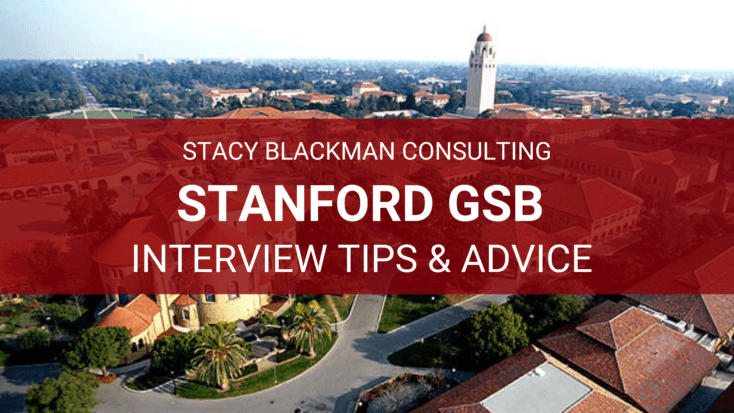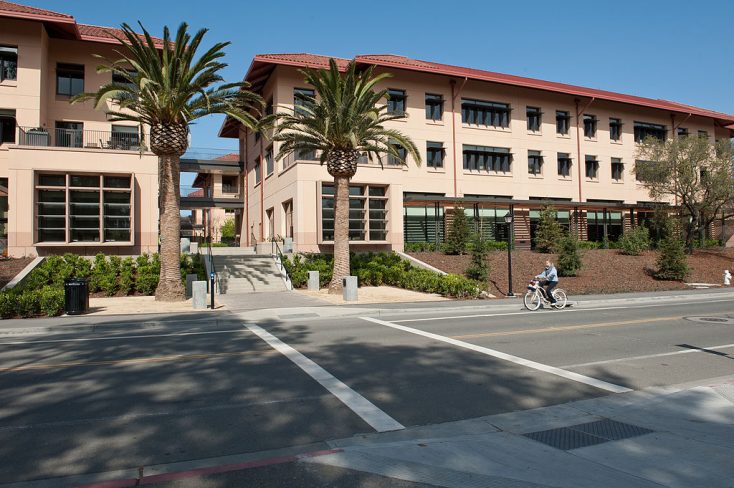
If you’ve made it to the interview stage at the Stanford Graduate School of Business, congratulations are in order. As you well know, the GSB has the most competitive admission stats in the world. With a 7% admissions rate, receiving an invite proves that Stanford already considers you a strong candidate.
Arguably more than any other program, Stanford looks for applicants who have formulated a worldview and understand who they are and what matters most to them.
We asked, “What does Stanford GSB Admissions look for?” of the former Stanford GSB Admissions Officers (AdCom) on the Stacy Blackman Consulting team. Here’s the consensus: Stanford GSB seeks talented, diverse, and smart people who will make a significant impact in business and society.
Stanford GSB students seem to have this ‘X’ factor associated with them, almost like an “unexpected” trait or experience. They take risks, push beyond the imaginable and lead with passion.
Need extra guidance? We can help with your Stanford GSB interview preparation.
Email us: info@stacyblackman.com to ask about availability.
Interview Invitations at Stanford GSB
The Stanford interview invitation process can be stressful because it extends interview invitations on a rolling basis. For example, Stanford extends interview invitations for round one applicants starting typically in early October and through the weeks of November. Erika on our team echoed this.
“I have had clients get an invite on the final day of the range for the past few years, so they really do send them throughout,” Erika notes. “I had a client get one at the start of the range and another last week, so it’s a little each day.”
Stanford continues to read applications/issue interview invitations right up to the deadline. The interview invitation usually expects the applicant to schedule the interview within ten days.

Sample Stanford GSB Interview Questions
Across our client pool, we have seen the following questions consistently across interviewers from the GSB:
- Tell me a time when you were blocked on a project or had to navigate a particularly difficult person or conflict
- Tell me about a time you built team culture
- Why an MBA, why Stanford, and what after the MBA
Likewise, we have consistently seen the following structural attributes across interviews from the GSB:
- Conversational but challenging in tone
- Starts with general get-to-know-you questions
- Behavioral questions
- Opportunity to ask questions
Stanford Interviewer Criteria Matrix
Many of our SBC consultants have served as interviewers for Stanford GSB and have shared a sample interviewer assessment matrix here. Your interviewer will be assessing the following criteria during the exchange.
| Academic Strength | *College academic record *Strong GMAT *Professional accreditation |
| Intellectual Capacity | *Judgment of recommenders/interviewer *GMAT *Professional performance from an intellectual perspective |
| Leadership Potential: Will the Candidate Make a Difference in the World? | *Strategic, innovative/creative, confident thinker *Not satisfied with the status quo *Curious, visionary *Ambitious, intense and sustained drive to succeed and make a difference in the world *Charismatic, good communicator, able to gain support from/inspire others *Competitive, tenacious *Decision making under uncertainty/stress, ability to assess risk *Versatile (function, knowledge), specialized talents (e.g., design, aesthetics, quantitative, verbal, social) *Execution capabilities in longer-term efforts requiring diverse resources *Maturity to understand that success requires aid from others (in addition to one's own abilities and hard work) *Avoids hubris |
| Management/Interpersonal Skills | *Analytical acumen *Project management, results-orientation, sets clear directions *Strong work ethic, reliability, build respect *Interpersonal-collaborative instincts, manage up-down-sideways, build short and long-term relations, team spirit *Performance under pressure, multi-tasking *Culture carrier, mentor-trainer *Cross-functional management |
| Globalization | *Global/diverse perspectives · Commitment to cross-cultural intelligence · Additional languages · Introspective, sensitive |
| Career Direction: Why | *Pragmatism vs. ambition *Progression from past (function, skills, and/or industry) *Longer-term: recognizing and grasping opportunities, undertaking dreams *Halo/foundation of ethics (value construct, front-page test) *Peculiar strengths *Interests *Seek short vs. long-term rewards *Bored easily? *Social, collaborative aspects *Risk profile *What do they need to learn, skills *Network? Degree? *Geographic change |
| Ambition: Why | *Parents *Friends/peers *Defining moment *Role models *Work ethic? *How do they judge success? *What makes them happy? *Something they are afraid of? |
| Why Choose Our School | *Career, location, culture, alumni recommendation, global reputation, destiny? *Geography – U.S. “core” exposure *Management training |
| How Would They Fit with the Class? | *Engaged and engaging *Positive/optimistic, inspirational *Team player, perhaps team leader *Challenge each other, vigorous discourse, competitive *Specialized experiences/knowledge/skills to share *Personal appeal (range of potential styles), mostly social/fun |
| Many are Qualified. Why Bring You into Our Family? | *Will they make a difference? *Will they make a positive difference? *Career – for self and others? [Helps if they can develop an answer to a difficult question.] |
Stacy’s 6 Tips to Ace the Stanford GSB Interview
1. Show how you have made your indelible mark.
Sharing stories about your past leadership achievements will help your interviewer gauge your potential for realizing your future ambitions. The scale of your achievement is less important than the fact that you have left indelible footprints in areas that matter to you.
2. Demonstrate passion and vision.
You want to show that your reasons for applying to business school go beyond the goal of merely scaling the corporate ladder. During your interview, demonstrate that you have a talent for seeing greater possibilities and a track record of rallying others to embrace that picture of the future and work together with you to realize it.
Your passions make you unique, and your achievements in these areas show the interviewer that you know what is truly important to you.
3. Show you are collaborative.
Stanford wants to determine if you will thrive in its “give more than you take” culture. Do you have the dynamic energy and drive to get involved and give back even when it’s not strictly required? Do you have a track record of contributing to the causes and communities you care about? Then the admissions committee is likely to conclude you will make their student community stronger.

4. Show that you have a global mindset.
Candidates should emphasize their ability to find common ground and form effective relationships with people different from themselves. Applicants who can provide evidence that they survive and thrive in new, unfamiliar environments will be of particular interest to the admissions committee.
Experience with the challenges of doing business globally and a natural curiosity for learning more about other countries and cultures will also be valued.
5. Demonstrate self-awareness.
The ability to explain why you value one accomplishment above others, what you learned from a setback, or the deeper meaning of your career goals is evidence of self-awareness. The self-aware individual also knows their strengths and weaknesses.
A quality that goes hand-in-hand with self-awareness is maturity. The fact that the admissions committee is seeking evidence of maturity suggests that you should look for opportunities to share defining moments in your life during the interview.
6. Have a compelling answer for the ‘Why Stanford?’ question.
While it’s true that the goals that made you apply to business school will be the same regardless of where you interview, how Stanford can help you achieve those goals should be something you have given serious thought to well before your interview.
Your answers should demonstrate that you have done your homework on the program. That means you’ve interviewed students, alumni, and professors, sat in on classes, or regularly read several Stanford student and professor blogs. Use what you know about the program’s curriculum and philosophy to prove that Stanford can help you achieve your goals like no other program.
Finally, know that interviewers will also expect that you have prepared thoughtful questions about the program for them to answer, so be sure to spend time planning for this portion of the interview as well. Avoid asking questions you could easily answer by looking at the admissions website and use this opportunity to learn more about Stanford GSB from someone with firsthand knowledge.
Stanford admits approximately 40 to 45 percent of interviewed candidates, so if you use these tips to help you craft your personal narrative and prepare for the exchange, you stand a good chance of convincing your interviewer that you deserve a seat in next year’s class.
Hire us for Stanford GSB interview preparation.
Email us: info@stacyblackman.com
to ask about availability.
HBS Interview Prep Advice from HBS AdCom
Hire us for HBS Interview Prep
Who would my SBC interviewer be?
The post Stanford GSB Interview Prep: Format, Criteria + Sample Questions appeared first on Stacy Blackman Consulting - MBA Admissions Consulting.

